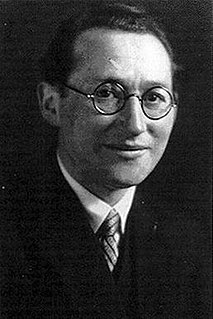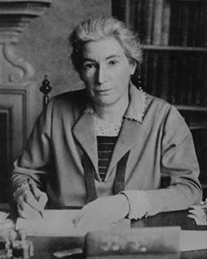Related Research Articles
Industrial and organizational psychology which is also known as occupational psychology, organizational psychology, or work and organizational psychology; is an applied discipline within psychology. Industrial, work and organizational psychology (IWO) is the broader global term for the field internationally.
Psychology is the science of mind and behavior. Psychology includes the study of conscious and unconscious phenomena, as well as feeling and thought. It is an academic discipline of immense scope. Psychologists seek an understanding of the emergent properties of brains, and all the variety of phenomena linked to those emergent properties, joining this way the broader neuro-scientific group of researchers. As a social science, it aims to understand individuals and groups by establishing general principles and researching specific cases.

Albert Bandura is a Canadian-American psychologist who is the David Starr Jordan Professor Emeritus of Social Science in Psychology at Stanford University.
Applied psychology is the use of psychological methods and findings of scientific psychology to solve practical problems of human and animal behavior and experience. Mental health, organizational psychology, business management, education, health, product design, ergonomics, and law are just a few of the areas that have been influenced by the application of psychological principles and findings. Some of the areas of applied psychology include clinical psychology, counseling psychology, evolutionary psychology, industrial and organizational psychology, legal psychology, neuropsychology, occupational health psychology, human factors, forensic psychology, engineering psychology, school psychology, sports psychology, traffic psychology, community psychology, and medical psychology. In addition, a number of specialized areas in the general field of psychology have applied branches. However, the lines between sub-branch specializations and major applied psychology categories are often blurred. For example, a human factors psychologist might use a cognitive psychology theory. This could be described as human factor psychology or as applied cognitive psychology.

Edwin Garrigues (Gary) Boring was an American experimental psychologist, Professor of Psychology at Clark University and at Harvard University, who later became one of the first historians of psychology. A Review of General Psychology survey, published in 2002, ranked Boring as the 93rd most cited psychologist of the 20th century, tied with John Dewey, Amos Tversky, and Wilhelm Wundt.

Kurt Lewin was a German-American psychologist, known as one of the modern pioneers of social, organizational, and applied psychology in the United States. Exiled from the land of his birth, Lewin made a new life for himself, in which he defined himself and his contributions within three lenses of analysis: applied research, action research, and group communication were his major offerings to the field of communication.
William Richard Miller is an American clinical psychologist, an emeritus distinguished professor of psychology and psychiatry at the University of New Mexico in Albuquerque. Miller and Stephen Rollnick are the co-founders of motivational interviewing.
Floyd Henry Allport was an American psychologist who is often considered "the father of experimental social psychology", having played a key role in the creation of social psychology as a legitimate field of behavioral science. His book Social Psychology (1924) impacted all future writings in the field. He was particularly interested in public opinion, attitudes, morale, rumors, and behavior. He focused on exploration of these topics through laboratory experimentation and survey research.
Rodney L. Lowman is an American psychologist, academic administrator and entrepreneur whose major contributions have been in the areas of career assessment and counseling, ethical issues in Industrial and Organizational Psychology, the integration of clinical psychology and I-O psychology and helping to develop the field of Consulting Psychology. In a study of the most prolific contributors to the Consulting Psychology Journal: Practice and Research, Lowman was rated the second highest contributor for articles for the period 1992-2007.
Psychology encompasses a vast domain, and includes many different approaches to the study of mental processes and behavior. Below are the major areas of inquiry that taken together constitute psychology. A comprehensive list of the sub-fields and areas within psychology can be found at the list of psychology topics and list of psychology disciplines.
Personnel Psychology is a subfield of Industrial and Organizational Psychology. Personnel psychology is the area of industrial/organizational psychology that primarily deals with the recruitment, selection and evaluation of personnel, and other job aspects such as morale, job satisfaction, and relationships between managers and workers in the workplace. It is the field of study that concentrates on the selection and evaluation of employees; this area of psychology deals with job analysis and defines and measures job performance, performance appraisal, employment testing, employment interviews, personnel selection and employee training, and human factors and ergonomics.

Beatrice Edgell was a British psychologist, researcher and university teacher. She taught at Bedford College in the University of London from 1897 to 1933. She was the first British woman to earn a PhD in psychology and the first British woman to be named a professor of psychology. She was also the first female president of the British Psychological Society, the Aristotelian Society, the Mind Association and the Psychological Division of the British Association for the Advancement of Science.

Richard M. Ryan is a professor at the Institute for Positive Psychology and Education at the Australian Catholic University and a research professor at the University of Rochester. He earned his Ph.D. in clinical psychology from the University for Rochester and his B.A. from the University of Connecticut. Ryan is a clinical psychologist and co-developer with Edward L. Deci, of Self-Determination Theory (SDT), one of the most influential theories of human motivation. SDT is a macrotheory of motivation, psychological development and wellness. The theory has spawned basic research on intrinsic and extrinsic motivation, and the facilitaition and undermining of volitional motivation. SDT has been widely applied on research and interventions in work organizations, schools, clinical settings, virtual environments and sports, among other areas of application.
Arthur William Kornhauser was an American industrial psychologist. He was an early researcher on topics such as labor unions and worker attitudes, and advocated a form of industrial psychology that approached problems from the workers' standpoint rather than that of management. He has been described as one of the most important early figures in organizational psychology, and is particularly remembered for his focus on worker well-being. His work was interdisciplinary, crossing the boundaries between industrial psychology and sociology and political science.
Wendell R. Garner was a Yale University psychology researcher credited with making significant contributions to the cognitive revolution, in which George Miller and others applied emerging research from the fields of artificial intelligence and computer science to test ideas about human mental processes.
Albert T. Poffenberger (1885–1977) was an American psychologist and a past president of the American Psychological Association (APA).

Florence Harriet Levin Denmark is an American psychologist and a past president of the American Psychological Association (APA). She is a pioneering female psychologist who has influenced the psychological sciences through her scholarly and academic accomplishments in both psychology and feminist movements. She has contributed to psychology in several ways, specifically in the field of psychology of women and human rights, both nationally and internationally. Since childhood, Denmark was academically successful. She received her PhD in social psychology from the University of Pennsylvania.
Calvin Perry Stone was an American psychologist, known for his work in comparative and physiological psychology. He was also a past president of the American Psychological Association (APA) and a member of the National Academy of Sciences (NAS).
James Arthur Bayton was an American psychologist. He conducted research in areas of personality, race, social issues, and consumer psychology.
Donald Gildersleeve Paterson was an American psychologist known for pioneering applied psychology, in particular vocational counseling, industrial/organizational psychology, and differential psychology in the United States. He was a professor of psychology at the Department of Psychology at the University of Minnesota from 1921-1960.
References
- 1 2 3 4 5 Maura J. Mills (January 2012). "The Beginnings of Industrial Psychology: The Life and Work of Morris Viteles". Society of Industrial and Organizational Psychology.
- 1 2 3 4 5 6 7 8 Karen Freeman (1996-12-15). "M.S. Viteles, 98, Industrial Psychologist, Dies". New York Times.
- ↑ Gary P. Latham (2012). Work Motivation: History, Theory, Research, and Practice. p. 15. ISBN 978-1412990936.
- 1 2 3 Laura L. Koppes (2014). Historical Perspectives in Industrial and Organizational Psychology. ISBN 978-1317824480.
- 1 2 3 4 "History of psychology at Penn: Morris Viteles". University of Pennsylvania. Retrieved 2017-11-29.
- ↑ Frank J. Landy; Jeffrey M. Conte (2010). Work in the 21st Century: An Introduction to Industrial and Organizational Psychology. p. 203. ISBN 978-1405190251.